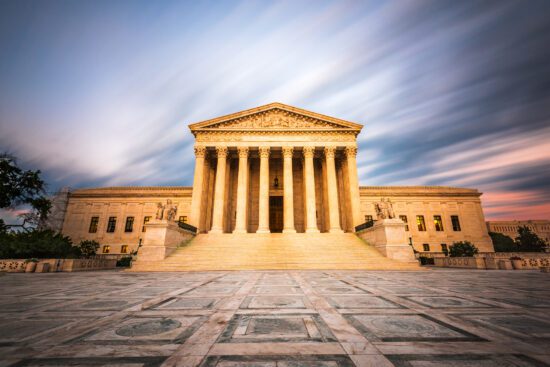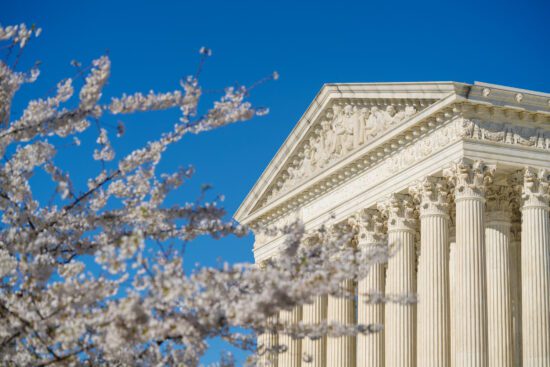The Bible is clear that (1) Christians should care about injustice (Micah 6:8, 2 Chronicles 19:7, Prov 20:23) and (2) Christians should respect civil government and laws (Rom 13:1-2, 1 Tim. 2:1-2). Yet over the centuries, Christians have toiled over the dichotomy between a godly passion for justice and the biblical call to submission.
Believers have often found themselves at odds with the rulers and laws of the land they live in. In America today, laws stand that threaten the lives of the unborn, diverge from the biblical understanding of gender and sexuality, and forsake the widow and orphan. Currently, the U.S. House of Representatives is considering 12 appropriation bills for FY2022 that propose the removal of pro-life riders from the budget such as the Hyde and Weldon Amendments. Thankfully, Christians living in the 21st century are not the first group of believers to find ourselves in disagreement with the laws and norms of their culture. Jesus prepared us to expect as much, when he prayed for the protection of his people in the garden of Gethsemane, “they are not of the world, even as I am not of it” (John 17:16).
The book of 1 Peter was written as the church faced persecution and focused on instructing Christians about how to live faithfully in a time of extraordinary evil. Peter instructs believers to use good conduct and submission to those in authority as a testament to the gospel (1 Pet. 2:13). We have been made free by the blood of Christ, we must now use our freedom not to bring chaos but instead to show the world the gentleness and servant nature of our Savior (1 Pet. 2:16). This includes submission to human authority (1 Pet. 2:15). Peter gives us a beautiful framework for what living as a servant of God looks like, calling Christians to “Honor everyone. Love the brotherhood. Fear God. Honor the emperor (1 Pet. 2:17).
Honor everyone.
The first two principles at work in Peter’s framework inform how the Christian is to go about showing honor to those outside the church (the first principle) and those within the church (the second). The first portion reminds believers that we are to honor (or rightly respect) all people, which includes recognizing and standing up for their dignity as image-bearers. The way we treat people should reflect the inherent worth each individual possesses as one created by God.
Regarding those who are particularly vulnerable, Proverbs 31:8-9 calls believers to: “Speak up for those who cannot speak for themselves, for the rights of all who are destitute. Speak up and judge fairly; defend the rights of the poor and needy.” The Bible is filled with accounts of brave men and women of faith who defied their rulers to hold fast to their faith and protect the innocent: the Hebrew midwives who resisted Pharoah’s command to kill the Israelite babies (Ex. 1), Rahab’s defiance of Jericho’s rulers and protection of the Israelite spies (Josh. 2), and Obadiah’s hiding of the prophets of God from the murderous queen Jezebel (1 Kings 18). This is rooted in the reality that the Lord is a God of justice, who hates abuses of the poor, vulnerable, and powerless.
Love the brotherhood.
The second principle — love of the brotherhood — calls Christians to love one another. This includes within our own local churches and Christian communities, but it also extends to the body of Christ across the world. This should also inform how Christians respond to cries for justice from within the church. It was the Black church and its advocacy, activism, and exercise of peaceful civil disobedience that called the United States to respect the full equality and dignity of Black Americans during the Civil Rights Movement.
Christians should strive to see an expansion of God’s kingdom here on earth. We should seek justice in a way that displays the character of God and his compassion for the hurting, and especially those who are our brothers and sisters in Christ (Gal. 6:10). We should work to cultivate justice that points to the kingdom of perfect righteousness that is coming.
Practicing this principle can take many different forms. As we look to the Scriptures, we see that Paul spent a great deal of time collecting funds from other Christians for the relief of the church in Jerusalem (1 Cor 16:1–4; 2 Cor 8:1–9:15; Rom 15:14–32). We also see Paul instructing Philemon to treat Onesimus not as a slave but as a brother (Philemon 1:16). Today, showing love for the brotherhood could mean financially assisting a believer facing a medical crisis, volunteering for a Christian justice or poverty relief ministry, helping to repair a church building damaged by a natural disaster, or providing resources and support for a community of Christian refugees from another country.
Fear God.
The final two principles are important because the first one controls the second. The fear of God is to take priority over our honor of the emperor, and it’s also our motivation for respecting the rulers he has set in place (Rom. 13:7). The same Peter who writes the epistle is the one who told the Jewish leaders in the early days of the church, “We must obey God rather than human men” (Acts 5:29). When the early church was forbidden from speaking or teaching in the name of Jesus, Peter and John refused and said, “Which is right in God’s eyes: to listen to you, or him? You be the judges! As for us, we cannot help speaking about what we have seen and heard” (Acts 4:18-20).
Similarly, during the reign of the Babylonian King Nebuchadnezzar, the young Israelites Shadrach, Meshach, and Abednego courageously refused to worship the King’s statue and were thrown into a burning furnace (Dan. 3). Later, Daniel would be cast into a den of lions for his refusal to follow the king’s unjust command forbidding prayer (Dan. 6).
Again, the Civil Rights Movement illustrates how Christians should be willing to accept punishment and consequences for refusing to obey unjust laws. Those who protested against the prejudiced treatment of African Americans under Jim Crow segregation were willing to face jailing (and often unlawful physical punishment) to demonstrate that the government’s policies were not only unconstitutional but unjust. It was in one such prison that Martin Luther King Jr. wrote his Letter from Birmingham Jail as a plea to forsake silence and delayed justice.
Early Baptists in England and North America also faced persecution from the government on account of their religious faith. Men like Thomas Helwys and Isaac Backus refused to attend state-sanctioned churches and suffered retribution from the state. Like the apostles in Acts, because of our fear of God, Christians should be unwilling to submit to unjust laws that deny justice and equality to our fellow human beings.
Honor the emperor.
First Peter 2:11-17 identifies Christians as sojourners and exiles in this world and urges believers to “keep your conduct among the Gentiles honorable” and to “be subject for the Lord’s sake to every human institution. For this is the will of God, that by doing good you should put to silence the ignorance of foolish people.” Therefore, Christians should instead give thanks and pray for those given authority over us “that we may lead a peaceful and quiet life, godly and dignified in every way (1 Tim. 2:1-2).
Like Peter, Paul wrote Romans, his letter to the church in Rome, during a period of persecution from the Roman Emperor Nero, making his commands concerning government all the more powerful. Romans 13 clarifies that every person should be subject to their governing authorities because their authority has been instituted by God. Though we are often tempted to forget, government in general is a good gift from God intended to keep order and lead to the flourishing of society. And Paul warns that we risk incurring the wrath of God and violating our consciences when we disobey the civil authorities he has established (v. 5). As Christians, we should honor our rulers, pay taxes, and respect those in authority with our words and actions. And as we do so, we remember that we are actually submitting to and honoring our King.
So what now?
In his commentary of Acts 5, John Stott says, “We are to submit right up to the point where obedience to the state would entail disobedience to God. But if the state commands what God forbids or forbids what God commands, then our plain Christian duty is to resist, not to submit, to disobey the state in order to obey God.”
As Christians, we should default to respect civil authorities and submit to the laws we are subject to. When a civil mandate contradicts our heavenly mandate, our allegiance to God’s kingdom should win. Christians should resist laws that command sin and constantly work within the existing rules to change evil laws and promote righteousness. Above all, we should do so as we remember that our effort and obedience is ultimately aimed at pleasing God.










